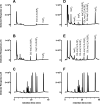Phytase dose-dependent response of kidney inositol phosphate levels in poultry
- PMID: 36260560
- PMCID: PMC9581429
- DOI: 10.1371/journal.pone.0275742
Phytase dose-dependent response of kidney inositol phosphate levels in poultry
Abstract
Phytases, enzymes that degrade phytate present in feedstuffs, are widely added to the diets of monogastric animals. Many studies have correlated phytase addition with improved animal productivity and a subset of these have sought to correlate animal performance with phytase-mediated generation of inositol phosphates in different parts of the gastro-intestinal tract or with release of inositol or of phosphate, the absorbable products of phytate degradation. Remarkably, the effect of dietary phytase on tissue inositol phosphates has not been studied. The objective of this study was to determine effect of phytase supplementation on liver and kidney myo-inositol and myo-inositol phosphates in broiler chickens. For this, methods were developed to measure inositol phosphates in chicken tissues. The study comprised wheat/soy-based diets containing one of three levels of phytase (0, 500 and 6,000 FTU/kg of modified E. coli 6-phytase). Diets were provided to broilers for 21 D and on day 21 digesta were collected from the gizzard and ileum. Liver and kidney tissue were harvested. Myo-inositol and inositol phosphates were measured in diet, digesta, liver and kidney. Gizzard and ileal content inositol was increased progressively, and total inositol phosphates reduced progressively, by phytase supplementation. The predominant higher inositol phosphates detected in tissues, D-and/or L-Ins(3,4,5,6)P4 and Ins(1,3,4,5,6)P5, differed from those (D-and/or L-Ins(1,2,3,4)P4, D-and/or L-Ins(1,2,5,6)P4, Ins(1,2,3,4,6)P5, D-and/or L-Ins(1,2,3,4,5)P5 and D-and/or L-Ins(1,2,4,5,6)P5) generated from phytate (InsP6) degradation by E. coli 6-phytase or endogenous feed phytase, suggesting tissue inositol phosphates are not the result of direct absorption. Kidney inositol phosphates were reduced progressively by phytase supplementation. These data suggest that tissue inositol phosphate concentrations can be influenced by dietary phytase inclusion rate and that such effects are tissue specific, though the consequences for physiology of such changes have yet to be elucidated.
Conflict of interest statement
The feeding trials described in this study were commissioned at Nottingham Trent University by AB Vista. AB Vista had no role in conducting the research, generating the data, interpreting the results or writing the manuscript.
Figures

Similar articles
-
Phytase supplementation effects on amino acid digestibility depend on the protein source in the diet but are not related to InsP6 degradation in broiler chickens.Poult Sci. 2020 Jun;99(6):3251-3265. doi: 10.1016/j.psj.2020.03.010. Epub 2020 Apr 8. Poult Sci. 2020. PMID: 32475461 Free PMC article.
-
Dietary effects on inositol phosphate breakdown in the crop of broilers.Arch Anim Nutr. 2016;70(1):57-71. doi: 10.1080/1745039X.2015.1112622. Epub 2015 Dec 3. Arch Anim Nutr. 2016. PMID: 26631507
-
Effect of supplemental phytase and xylanase in wheat-based diets on prececal phosphorus digestibility and phytate degradation in young turkeys.Poult Sci. 2018 Jun 1;97(6):2011-2020. doi: 10.3382/ps/pey030. Poult Sci. 2018. PMID: 29462419 Free PMC article.
-
Interactions of zinc with phytate and phytase in the digestive tract of poultry and pigs: a review.J Sci Food Agric. 2023 Dec;103(15):7333-7342. doi: 10.1002/jsfa.12879. Epub 2023 Aug 10. J Sci Food Agric. 2023. PMID: 37486290 Review.
-
Phytase in non-ruminant animal nutrition: a critical review on phytase activities in the gastrointestinal tract and influencing factors.J Sci Food Agric. 2015 Mar 30;95(5):878-96. doi: 10.1002/jsfa.6998. Epub 2014 Dec 19. J Sci Food Agric. 2015. PMID: 25382707 Free PMC article. Review.
Cited by
-
Metabolite Profiling Under Dietary Myo-Inositol Supplementation in Laying Hens from Two High-Performing Strains.Animals (Basel). 2025 May 12;15(10):1392. doi: 10.3390/ani15101392. Animals (Basel). 2025. PMID: 40427270 Free PMC article.
-
Accentuating the positive and eliminating the negative: Efficacy of TiO2 as digestibility index marker for poultry nutrition studies.PLoS One. 2023 Jun 26;18(6):e0284724. doi: 10.1371/journal.pone.0284724. eCollection 2023. PLoS One. 2023. PMID: 37363920 Free PMC article.
-
Towards Improved Bioavailability of Cereal Inositol Phosphates, Myo-Inositol and Phenolic Acids.Molecules. 2025 Feb 1;30(3):652. doi: 10.3390/molecules30030652. Molecules. 2025. PMID: 39942756 Free PMC article. Review.
-
The phytase RipBL1 enables the assignment of a specific inositol phosphate isomer as a structural component of human kidney stones.RSC Chem Biol. 2023 Jan 27;4(4):300-309. doi: 10.1039/d2cb00235c. eCollection 2023 Apr 5. RSC Chem Biol. 2023. PMID: 37034402 Free PMC article.
References
-
- Lucca W, Shirmann GD, Figueiredo AM, Zanella I, De Oliveira V. Endogenous losses and true digestibility of phosphorus in rice bran with or without phytase determined with piglets. Ciência Rural. 2016;46(6):1082–7.
-
- Selle PH, Ravindran V. Microbial phytase in poultry nutrition. Anim Feed Sci Technol. 2007;135(1–2):1–41.
-
- Cowieson AJ, Ruckebusch JP, Sorbara JOB, Wilson JW, Guggenbuhl P, Roos FF. A systematic view on the effect of phytase on ileal amino acid digestibility in broilers. Anim Feed Sci Technol. 2017;225(February):182–94.
Publication types
MeSH terms
Substances
Grants and funding
LinkOut - more resources
Full Text Sources
Miscellaneous

